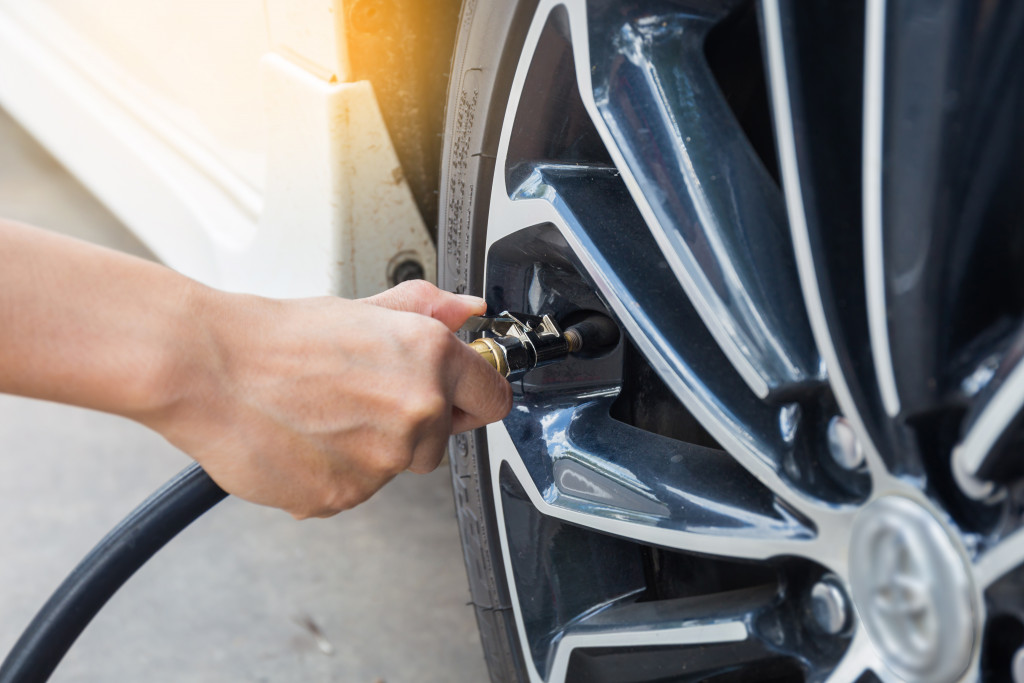When your tires become brittle and lose their moisture, they have developed dry rot that can eventually lead to a tire blowout. This visible cracking is usually caused by low tire inflation, prolonged exposure to the sun, or not using the tires for a long time, so using tire covers or wheel socks is essential for added protection to the tires.

What Causes Dry Rotting?
Sidewall weathering happens when the rubber compounds used to create tires begin to break down. When your tires are exposed to extreme environmental conditions, natural degradation happens due to climate changes, exterior elements, and high ozone concentrations that lead to cracking or dry rotting.
Some common causes of early sidewall weathering are:
- Low inflation pressure
- Extremely high temperatures
- Lengthy storage of tires
- Excessive exposure to UV rays
When inspected, sidewall weathering has a breakable appearance which can cause the rubber pieces to fall off, deep cracks are visible on the sidewall, and the color begins to fade. There can also be cracking on the tread pattern in severe sidewall weathering.
How to Prevent Tire Dry Rot?
Once you see obvious deterioration on your tires, you might need to replace them immediately to prevent additional damage. Avoid further damage and expensive costs by following these proper tire maintenance measures to help prolong your tires’ lifespan:
Avoid Exposure to Sunlight
Too much UV rays from the sun are one of the main causes of premature sidewall weathering. When UV rays penetrate the rubber, it dries out and eventually destroys the rubber compounds. Park your vehicle in shaded areas to avoid too much heat and sunlight. Always cover your tires for added protection every time you need to park outside.
Avoid Harmful Chemicals
If you’re going to use cleaning products or tire protectants, always check the product labels and make sure you know what kind of chemicals you’re using on your tires. Avoid petroleum-based products because they may degrade the rubber that can lead to premature cracking.
Also, avoid using products that are not meant for tires, such as dishwashing detergents. These chemicals needed to treat tire contaminants are different from common household cleaning products. Dish detergents usually contain additives that can remove the necessary oils and coatings from the rubber, losing the tires’ UV protection and flexibility.
To ensure that your tires stay in excellent shape, don’t avoid professional service. It’s a more cost-effective measure, and professionals can also restore your tires to a brand new condition inside and out.
Avoid Overloading
Tires have a recommended load capacity for a reason. Avoid overloading as it can place too much stress, leading to cracking and tire failure. Here are some ways to avoid overloading your vehicle:
- Train Your Drivers on Proper Loading: Your drivers should know the proper loading techniques to avoid damaging your vehicle, especially your tires. Make sure they are also trained in proper freight distribution to avoid further damage.
- Avoid Carrying Unnecessary Items: Eliminate unnecessary cargo to avoid overloading your vehicle. Carry items you only need and those that can fit as much as possible.
- Choose a Different Vehicle: Make sure that you use the proper vehicle for your cargo, depending on your needs. For instance, a pickup truck with a pull-out shelving system and topper can be a good choice as it can haul more weight.
Maintain Proper Tire Storage
The recommended method of storing tires is to hang them up because it prevents too much stress on them. If you need to stack them up, make sure you don’t stack them too high. Also, make sure they are clean before storing to avoid dry rot. Remember to store them in a room with a constant temperature below 25 degrees Celsius because temperature swings can eventually lead to dry rotting.
If you need to store your vehicle for more than three months, make sure to remove all tires. Sidewall cracks often occur when they are holding up the vehicle’s weight, so remove them to make sure these cracks don’t occur.
Choose a climate-controlled room with temperature and humidity control and avoid excessively dry environments. If the tires are removed from the vehicle, keep them in airtight bags by using vacuum-sealed or custom-sized specialist tire bags.
Investing in your tires is as important as investing in your vehicles. Dry rots can eventually cause leaks or blowouts, so ensure proper care and maintenance are observed to avoid long-term damage and costs. Once you see sidewall weathering signs, seek the help of a professional to have them checked.

